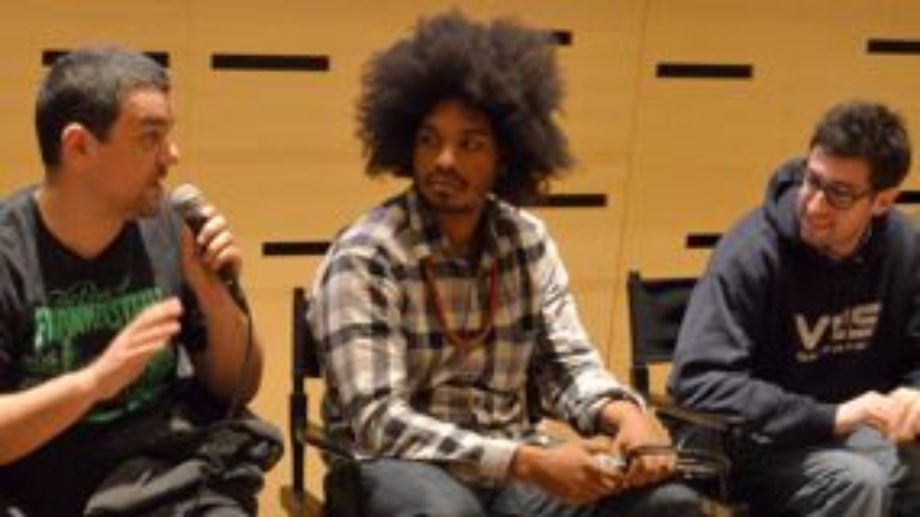
Emad Burnat & Guy Davidi (5 Broken Cameras), Kleber Mendonça Filho (Neighboring Sounds), Clarissa Knoll (Street Vendor Cinema), Joann Sfar (The Rabbi's Cat), Terence Nance (An Oversimplification of Her Beauty), Adam Leon (Gimme The Loot), Jason Cortlandt & Julia Halperin (Now, Forager) and Joachim Trier (Oslo, August 31st). Photo by Godlis.
Stepping into the spotlight this week at New Directors/New Films, a crop of directors who are new to American audiences took a moment to consider how they do what they do.
Do they feel isolated while working for years to bring a film to the big screen? To what extent do they consider an audience while making a new movie?
“I think it would be beyond narcissistic to not care about how or think about how this would affect an audience and that can mean alienating an audience if that's what you want to do,” explained Adam Leon, director of Gimme The Loot. His film won the top prize at the recent SXSW Film Festival in Austin and had a huge homecoming here at New Directors/New Films, playing well to sold out crowds at both the Museum of Modern Art and the Film Society of Lincoln Center. Leon, who once worked at the Film Society, explained that his film was designed to be a crowd pleaser.
“That's what a movie is, it's meant to be played for people,” Adam Leon explained. “Ultimately you may make the movie because it comes from yourself but you are going to play it for other people. That is its end result.”
Leon was one of ten ND/NF directors who sat down for an hour earlier this week to talk about their new films and how they made them. Also on hand for Monday's free panel discussion in the Amphitheater at the Elinor Bunin Munroe Film Center were Emad Burnat & Guy Davidi (5 Broken Cameras), Kleber Mendonça Filho (Neighboring Sounds), Clarissa Knoll (Street Vendor Cinema), Joann Sfar (The Rabbi's Cat), Terence Nance (An Oversimplification of Her Beauty), Jason Cortlandt & Julia Halperin (Now, Forager) and Joachim Trier (Oslo, August 31st). The conversation was moderated by Eric Kohn, an editor from event partner Indiewire.
On the question of working in a void, a few of the filmmakers pondered whether they feel isolated or connected when working on a new movie. Before they bring it to an audience. “I think that there's a difference between making your movie in a void and not thinking about the audience,” added Adam Leon, “I would hope that everybody here has thought about their audience when they made their movie.”
“It is impossible to work in a void,” offered Joachim Trier, director of Oslo, August 31st. His first film, Reprise, was a hit at New Directors a few years ago and his latest has been generating critical acclaim since debuting last year in Cannes. He reiterated that moviemaking is a shared experience for the people making the film and also the audience. “It's such a collaborative process,” Trier said. “It's a shared experience and then you have an imaginative audience and some days they hate you and some days you think there's hope that you will connect.”
“I had a void but it was more like working in an aesthetic vacuum,” added Terence Nance, director of the hard-to-describe new film An Oversimplification of Her Beauty. The experimental narrative has documentary elements and incorporates animation to tell a version of Nance's relationship with a woman in his life. He said that not having an aesthetic precedent for his work was nerve-racking. “When you don't know the movie you are going to make exactly a very slow anxiety builds that there is not something out there that you can look to for guidance,” Nance elaborated, adding, “I don't think there's a void in terms of thinking about the audience.”
Joann Sfar, co-director of The Rabbi's Cat, could relate a bit. His new film is based on his own graphic novel and parts of his own life. While he is very well known in the world of comic books, The Rabbi's Cat is only Sfar's second film. He said he's still learning how to communicate with an audience through this medium.
“My movies are made out of drawings,” elaborated Joann Sfar, “I've got now clue how to write a movie.” He said books about the craft of screenwriting from folks like Robert McKee are useless for him. “I hope I keep on not knowing how to write drama,” Sfar added. “What the Greeks taught me a long time ago is that there is a permanence in tragedy. This is what I get from drawings.”



